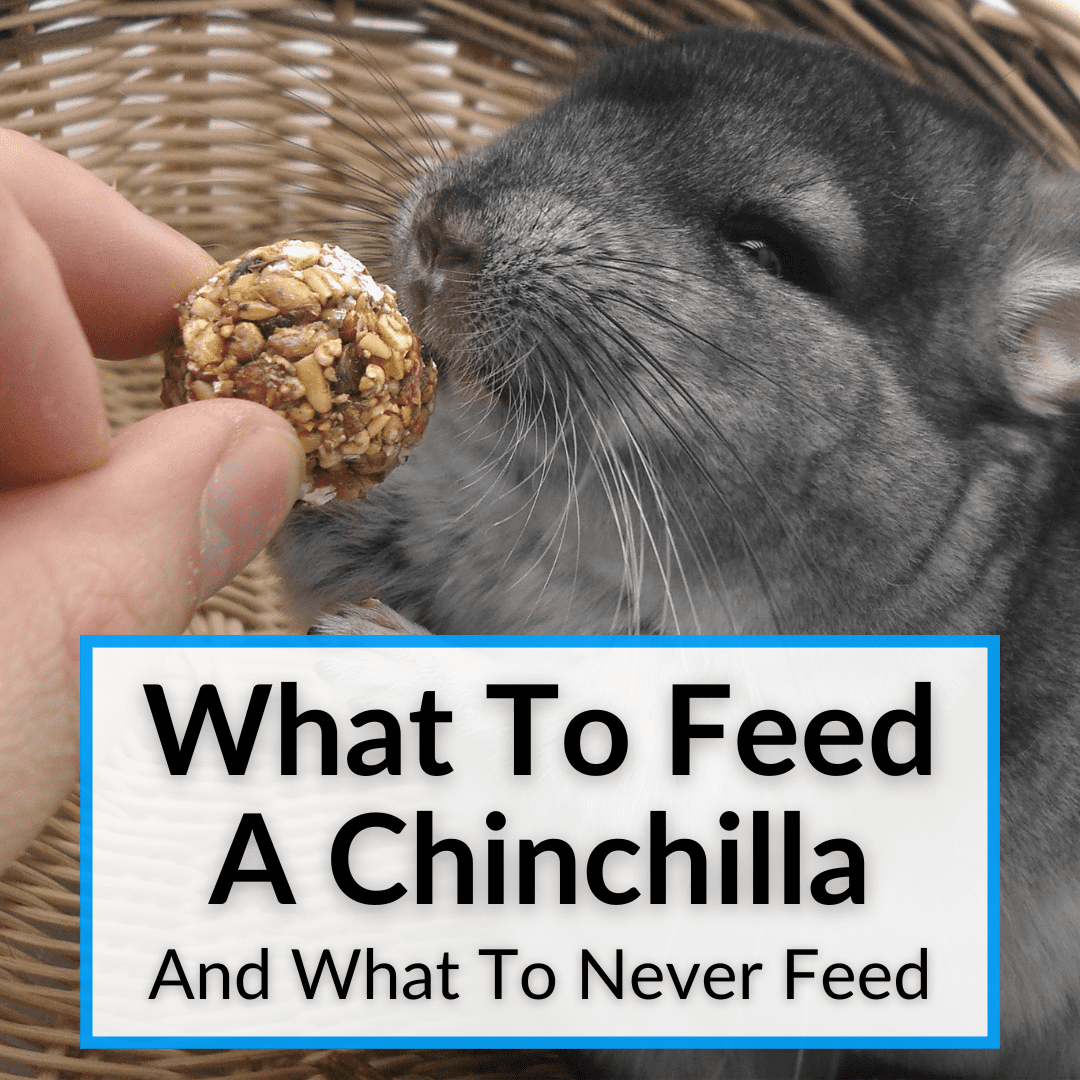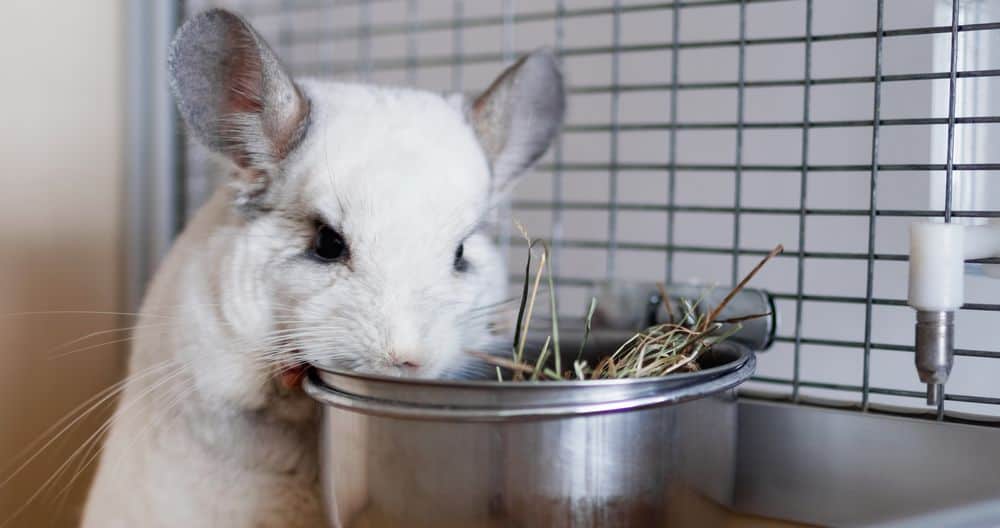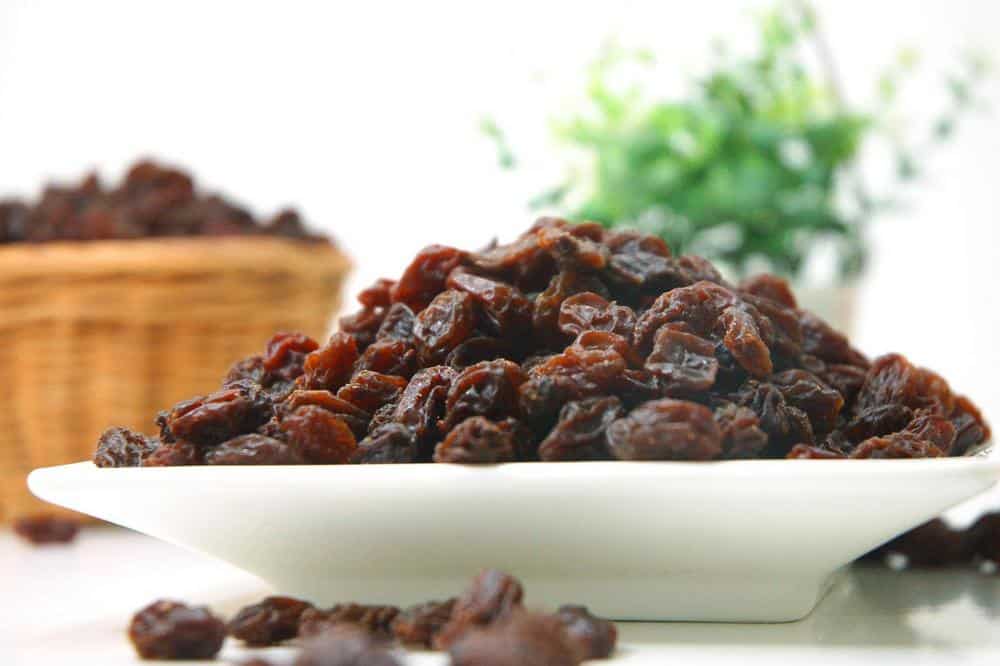
Chinchillas only need two foods: Timothy hay and pellets.
If you feed your chinchilla nothing else, it will live a happy and healthy life.
Of course, we all love spoiling our pets with the occasional treat.
That’s where things can get murkier.
There are a lot of great treats for chinchillas, but there are also a lot of foods we consider healthy that chinchilla’s should not eat.
Keep reading to learn exactly what to feed a chinchilla, and foods that you should never feed these delicate little rodents.
Contents
What To Feed A Chinchilla
A healthy chinchilla diet consists of roughage. Roughage is necessary for the correct functioning of a chinchilla’s digestive system. You can provide roughage to your chinchilla in the form of hay, grass, and twigs.
Chinchillas should also eat pelleted foods that are available commercially. Together with hay, these pellets provide all of the nutrition a chinchilla needs. You can also feed your chinchilla cereals, fresh fruits, and vegetables in moderation.
One of the main aspects of keeping a chinchilla (or any pet) is feeding it a healthy diet. Your chinchilla needs optimum nutrition and a balanced diet. Without them, it could get sick and die. These are the foods you should feed your chinchilla.
Hay

Hay is the chinchilla’s staple food and nearly 75 to 80% of your pet’s diet should consist of hay. In short, your pet needs a constant supply of fresh hay at all times. Do not make your chinchilla go without food for long.
Hay provides your chinchilla with fiber, or roughage, which is necessary for digestion. Moreover, it conditions the chinchilla’s constantly-growing teeth and helps wear them down, thereby preventing oral issues.
You can provide the following types of hay to your chinchilla:
- Timothy hay: Vets recommend timothy hay for chinchillas, because it is low in calcium and high in fiber.
- Orchard grass: Orchard grass is higher in fiber and protein than timothy hay. The downside to orchard grass is that it is slightly softer than timothy hay, due to the lack of stems in it. Therefore, it is not as helpful for your chinchilla’s teeth. Feed it in moderation or mixed with timothy hay.
- Oat hay: Oat hay is high in phosphorus and low in calcium. It is great for chinchillas, but in moderation. You can give it to your pet if it appears bored of eating timothy-hay.
- Botanical hay: Botanical hay often contains herbs like hibiscus. It is great for mixing with timothy hay or as an occasional tasty treat for your furry pet.
- Meadow hay: Meadow hay often contains flowers, seeds, and other edible grasses or plants. Therefore, it is best to only feed it to your chinchilla in moderation.
If your chinchilla is housed in a cage, you can attach a hay feeder rack containing the hay. Discard pink, moldy hay right away. It can make your chinchilla very sick. This article lists our top recommended hays and hay feeders.
Pellets

Chinchilla pellets contain all of the nutrition they need, so they should form the primary portion of their diet, along with the hay. In fact, pellets contain hay as well. You can see our recommended pellets for chinchillas here.
Chinchillas need about 1 to 2 tablespoons of pellets per day. You can choose commercial alfalfa or green-grass-based pellets. Make sure the pellets are specially formulated for chinchillas.
Chinchillas are crepuscular, meaning they are most active at dusk and dawn. Try to feed them pellets closer to these times, as far as possible.
Cereals
You can also feed your chinchilla a mixture of cereals like barley, oats, wheat, linseed, and maize. But these are all optional, and you need to make sure you do not feed these in excess. A daily ration of 30 to 40 g (1 tablespoon) per chinchilla is good.
Some picky chinchillas like to sort through the cereal mixture and only pick certain grains. If that is the case, you can mix the cereals with your chinchilla’s commercial pelleted food, if you really want your pet to get certain grains.
Avoid rice. Chinchillas can eat rice, but it is mostly carbohydrates and hard for them to digest. A tiny amount is fine, but any more will cause issues. And since rice has no real nutritional value for a chinchilla, why bother?
Fruits And Vegetables

As an occasional treat, feed your chinchilla pieces of carrots, apples, salads, etc. Be careful to avoid feeding any one type of vegetable in excess, because it could result in bloating or diarrhea in your chinchilla.
Or article entitled “Can chinchillas eat carrots?” has more on that vegetable and feeding it to a chinchilla.
You should also be aware that many fruits and vegetables are bad for these rodents. This article lists vegetables chinchillas can eat, and this one does the same for fruit.
Water
Chinchillas need a steady supply of fresh drinking water. Make sure to keep the water bottle clean to prevent bacterial growth. Ensure that the water bottle dispenses water steadily and is not clogged up. Your chinchilla could easily dehydrate in the summer due to a lack of water.
This article details our favorite water bottle for chinchillas. I actually have two of these attached to my pet’s cage at all times, just in case something goes wrong with one of them (like the spout gets clogged and my chinchilla can no longer get water out of it).
Chinchillas can go a long time without water, but there is no reason they should. Make sure yours always has fresh water available.
Treats
Chinchillas need to constantly chew to wear down their teeth. You can provide twigs and branches of fruit trees as a chew treat. Pet stores also carry mineral stones, cholla wood, and hazel sticks which keep things interesting and prevent boredom in chinchillas.
Succulent green feed like lawn clippings, dandelion greens, weeds, etc. is also great for chinchillas as treats. You can also provide your pet with dried fruits in tiny quantities, about once a month. See the best treats for chinchillas here.
Ideal Diet To Feed A Chinchilla

- Hay: A handful or more daily. Chinchillas need hay 24/7.
- Pellets: 30 to 80 g (one to two full tablespoons) per day. Feed this in the evening.
- Grains: No more than 30 to 40 g (one full tablespoon) per day.
- Some vegetables and fruit: E.g. ¼ apple or ¼ carrot once a week.
- Treats: A small healthy treat per day is good. Ideal treats help chinchillas file down their teeth are best. These include things like apple sticks.
When you introduce a new food or treat to your pet, observe it for a while. If the food causes indigestion or runny stool, discontinue it. Never overfeed your chinchilla. However, if you have a pregnant or nursing female, then she will need more food than the others.
Place the feed in containers and never throw it on the floor of the cage or the pen. Remove uneaten food right away to prevent contamination.
What To Never Feed A Chinchilla
Here are some foods to never feed your chinchilla.
- Cabbage, corn, peas, broccoli, spinach, and lettuce: These are heavy on your pet’s digestive system and can result in bloating. Corn is especially bad for chinchillas, since it also contains a toxic component.
- Bananas: Bananas are high in sugar and can result in bloat in your chinchilla.
- Asparagus, rhubarb, and rhubarb leaves: are poisonous to chinchillas.
- Nuts and seeds: Seeds like sunflower seeds are high in fats and phosphorus and can cause ulcers in your chinchilla. Raw peanuts and peanut butter are also high in fat which is bad for your chinchilla.
- Bread: In small quantities bread is OK, but do not feed too much of it to your chin, because it can result in bloating due to its high sugar content.
- Boiled meat: Some owners feed meat, but in small quantities. However, it is devoid of fiber and does not provide any valuable nourishment to your pet. Your pet will get all the protein it needs from cereals, hay, etc.
Good Chinchilla Snacks

Chinchillas are omnivores. In the wild, they eat both plants and animal meat (mainly insects and bird eggs) although their diet primarily consists of hay or grass.
For snacks, you can give your chinchilla a small piece of fruit or vegetable, such as an apple or carrot. You can also give it one or two raisins. But no more. Remember, raisins are high in sugar.
Chinchillas can eat eggs or insects in captivity, too. but there is no real reason to feed them these things. They get all the protein they need from their hay and pellets.
You can also provide salt licks and mineral licks which help satisfy your chinchilla’s salt cravings and also provide many minerals to your pet.
What Are A Chinchilla’s Favorite Treats?
Chinchillas love raisins and dried cranberries as treats. However, these must be fed in moderation due to their high sugar content. The same goes for high-calorie snack like popcorn or seeds.
They also love dried herbs like dandelion roots, leaves of strawberry or blueberry, and tiny pieces of fruit (apples, carrots). Organic rolled oats are also great treats for chinchillas.
They also like harder things they can use as chew toys to help grind down their ever-growing teeth. Your chinchilla can have pine cones or wood sticks from safe trees like pine or apple.
What Human Foods Are Safe For Chinchillas?
Human foods like certain fruits and vegetables, oats, and pieces of dried fruits like raisins, sultanas, cranberries, apple, pineapple, strawberries, etc. are safe for chinchillas, albeit in moderation.
What To Feed Chinchillas: Final Thoughts
Feed your chinchilla Timothy hay and specially formulated food pellets. Give it pellets twice a day and make sure it has a steady supply of fresh hay in its hay feeder. Those two foods are all chinchillas need to be happy and healthy.
If you want to reward your pet with the occasional treat, make sure it is not something that is bad for these little rodents. Some chew sticks, oats, or a bit of dried fruit are always great choices.
Leave a Reply